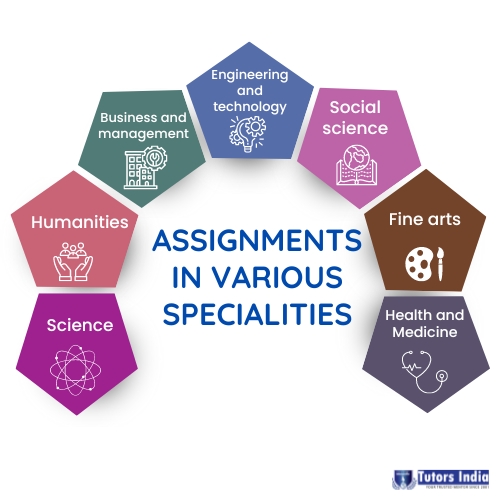Understanding the Differences in Writing Assignments across Various Specialisations in the UK
What is the meaning of assignment in education?
In education, the term “assignment” refers to a specific task or piece of work given to students by their teachers or instructors. Students are given assignments to help them learn by allowing them to practise, apply, and display their grasp of the subject matter.
Assignments serve as opportunities for students to practice and apply what they have learned, deepen their understanding of the subject matter, develop research and information literacy skills, and enhance their ability to communicate effectively. University professors often assess students’ progress, provide feedback, and evaluate their performance through assignments (Lim, 2020).
There are various types of assignments in UK universities. To know more about them, check out our study guide.
How do assignments differ across specialisations?

For students specialising in science like Biology, Chemistry, and Physics, assignments often revolve around experimental procedures, data analysis, and scientific reports. Components like methodology, data interpretation, and effectively communicating scientific findings are important.
Humanities subjects such as Literature, History, and Philosophy require critical thinking and analysis. Writing assignments in these fields often involve writing essays, book reviews, or research papers. The students are assessed based on their ability to develop compelling arguments, analyse texts, and express insightful interpretations.
Business Management assignments involve applying theoretical knowledge and practical skills. Case studies, business plans, and marketing campaigns are common types of assignments in this specialisation. Writing assignment in this specialisation focuses on analysing case studies, developing coherent strategies, and delivering professional reports.
Students specialising in Engineering and Technology require a blend of technical knowledge and practical skills. Assignments may involve problem-solving, design projects, and technical reports, wherein discussions pertain to practical approaches to tackling engineering challenges, documenting processes, and presenting results (Brown, 2021).
Social science disciplines such as Psychology, Sociology, Law and Economics require a blend of research skills and interpretative abilities. Assignments may include conducting surveys, analysing data, and presenting research findings. Students are evaluated for designing valid research studies, analysing data, and drawing meaningful conclusions.
For more guidance on writing a law assignment, check out our ‘Instructions to write Law Assignments.’
In fine arts and design, assignments prioritise creativity, imagination, and artistic expression. Tasks may involve creating artwork, designing visual presentations, or writing reflective essays. The students are assessed based on nurturing creativity, conveying emotions through art, and effectively expressing artistic concepts through writing.
Assignments in Medicine and Healthcare may include clinical case studies, research papers, or healthcare policy analysis. Students are assessed based on meeting the specific requirements of medical writing, emphasising the importance of accurate terminology, ethical considerations, and evidence-based research (Kim, 2020).
Conclusion
Assignments serve as valuable tools to assess students for their performance, and they differ in various specialisations. Each field demands specific skills and approaches, and this knowledge equips students to excel in their academic pursuits. These assignments help students hone their skills specific to their field.
To know more about the format and structure of an assignment, check our assignment examples.
At Tutors India, we offer assignment assistance to students pursuing their Masters degree in various specialisations. We have a diverse team of experienced researchers cum academic writers who help students to write an assignment. We also mentor students in writing an assignment that meets their university guidelines and ensure our assistance is high quality and free from errors and plagiarism.
References
Lim, J., & Polio, C. (2020). Multimodal assignments in higher education: Implications for multimodal writing tasks for L2 writers. Journal of Second Language Writing, 47, 100713.
Brown-Kramer, C. R. (2021). Improving students’ study habits and course performance with a “learning how to learn” assignment. Teaching of Psychology, 48(1), 48-54.
Kim, K. J. (2020). Project-based learning approach to increase medical student empathy. Medical Education Online, 25(1), 1742965.

 Previous Post
Previous Post Next Post
Next Post